World cup promotion in China: what opportunities it is creating?
The world cup is not only about soccer but also consumption
The FIFA World Cup is right now the world’s most-watched sports event and generates enormous attention. The Chinese market, while not enjoying the performance of their own team as they didn’t qualify to the competition, is one of the most active and passionate. This lead to various and lucrative business opportunities and local brands have been especially keen to take advantage of them.
For many consumers, the world cup means quite a few temporary changes in lifestyle and consumption patterns. The catering, sponsorship, tourism and merchandising sectors all exhibited some trends worth to further analyses, while the all word-cup-related consumption is also exhibiting a lot about the Chinese middle-class consumers.
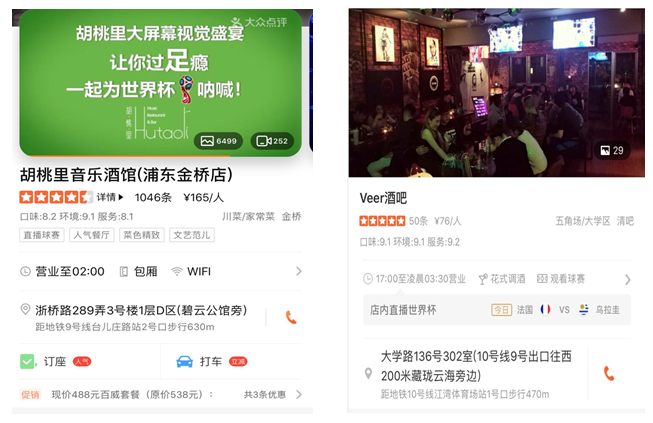
Example of catering world cup promotion in Shanghai – Hutaoli Music bar (胡桃里音乐酒馆) and Veer bar (Veer 酒吧) provide live screening of World cup. Dazhong Dianping (大众点评), Screenshot by Daxue Consulting.
The entire catering industry is also worth of attention. For example, the bars, supermarkets, cafes, and restaurants have all taken initiatives to promote themselves under the influence of world cup. In order to cater to enthusiastic fans’ consumption habits, many businesses have launched the world cup special services. Not only is there a huge screen for watching the game from every corner, and it has also put on some special world cup decoration, and has prepared many leisure areas. The consumers are answering positively to this environment and consumption is booming in the related venues.
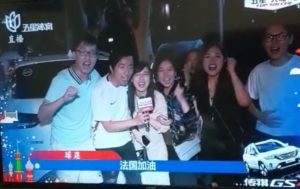
Olly Liu, Te Wei, Laurel Wu, Charlotte Li and Melo Xue from Daxue Consulting’s team cheering “Allez Les Bleus” when being interviewed by Great Sports (五星体育) outside of a Shanghai Bar after watching France vs. Argentina. Photo by Daxue Consulting
While a remarkable proportion of word-cup related consumption comes from food service venues, online shopping also accounts for a high share of the world cup consumption trend. The total sales of beer and other alcohols witnessed a steep increase. For example, Budweiser has launched several promotions sets during world cup season in its Taobao official store, by offering limited beer can editions, giving out price discounts and special gifts.
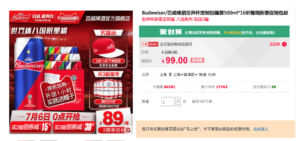
Budweiser’s Taobao promotion plans during world cup season by offering limited beer editions, discounts and gifts to consumers. The promotion combination has sold 60,291 sets in June only. Screenshot by Daxue Consulting
Another prosperous segment is the delivery service, from big brands like McDonald’s, Pizza hut to small local ones. Delivery giant Eleme(饿了么) claimed that during the world cup, its “on time Plus” service will cover 24 hours every day to satisfy growing needs of an enormous and still enlarging audience.
Chinese companies lead the race on World Cup advertising spending
Although China didn’t have the chance to participate in the 2018 World Cup, the topic has never failed to generate enormous attention among Chinese youngsters. Even in the actual field of World Cup in Russia, China appears almost everywhere, with Chinese brands taking up 1/3 of the top and second level sponsors. With different companies sponsoring teams and stars, the advertisement are all over the places. For now, China’s presence at the World Cup reflects its economic power more than its football strength.
According to data from the firm Zenith, the cost of advertising invested by enterprises in various countries during the 2018 Russian World Cup amounted to $2.4 billion (about 15.24 billion yuan). Among them, Chinese companies have spent $835 million dollars (about 5.3 billion yuan, nearly 35%), more than US $400 million (about 0.063 billion yuan), and more than Russia $64 million (about 0.01 billion yuan).
Compared with the 2014 Brazil World Cup four years ago, this time, Chinese enterprises has increased from 1 to 7 sponsors which are Wanda (万达), Mengniu (蒙牛), Hisense (海信), VIVO, Yadea (雅迪), Diking (帝牌) and LUCI (指点艺境). They all aspire to either boost the sales growth or enhance their brand reputation, popularity and global visibility through the world-class sports festival.
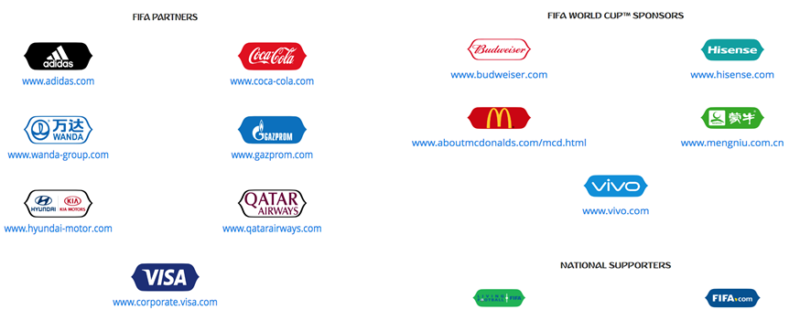
FIFA Russian World Cup Partners, Sponsors and National supporters, Graph from FIFA.com
The world cup advertising has generated interest with consumers in China. The digital activity reached its third highest peak in June 15th, with the coming out of first result of Russia vs. Saudi Aribia and Coca Cola’s Iceland commercial, creating discussion on social media. On July 22nd and on June 25th, the Baidu index reached its highest peaks, as media coverage actually shared news about some of these advertising and the related content.
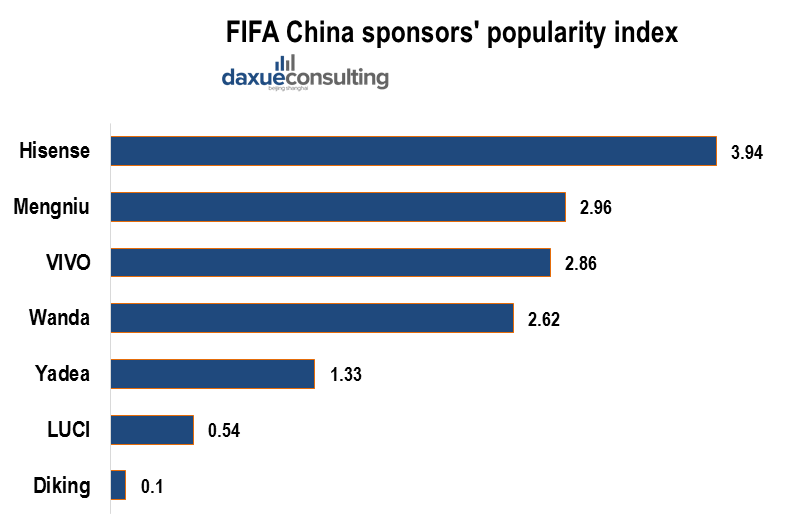
FIFA Russian World Cup Chinese Partners, Sponsors and National supporters popularity index, Graph from FIFA.com
According to a ranking released by Weibo, which indicates the hotspot index of sponsors, Hisense ranked the first among Chinese brands, with Mengniu, VIVO and Wanda followed.
In 2016, Hisense became a sponsor of the European Cup, which had a remarkable impact on its brand recognition. The brand of Chinese electrical appliances has attracted huge attention among Europeans overnight. Its global popularity increased by 6% and in the second quarter of 2016, the sales of Hisense TV in the European market increased by 65%. In the meantime, its domestic TV market share also increased by 1.87 %.
On June 13th, Hisense released the world cup version of AI TV system, which has four core technologies: “full scene search”, “full scene voice”, “small life circle” and “AI painting”(“全场景图搜”“全场景语音” “小聚生活圈”和“AI画质”). Consequently, the search increased greatly in the following days.

Baidu Index trend line for the keyword “海信电视” (Hisense) between May 2018 and June 2018.
Another famous brand is Mengniu, which is the first dairy brand collaborating with FIFA in the global sponsorship level. It is also the first brand in China’s food and beverage industry to be world cup global sponsor.
Early before the World cup, Mengniu has collaborated with Beijing Metro line 1 and launched a series of metro of special 2018 world cup edition. Mengniu combines the world cup scene with the function of metro information to not only promote its brand but also win the hearts of many youngsters with its interesting and inspiring quotes.
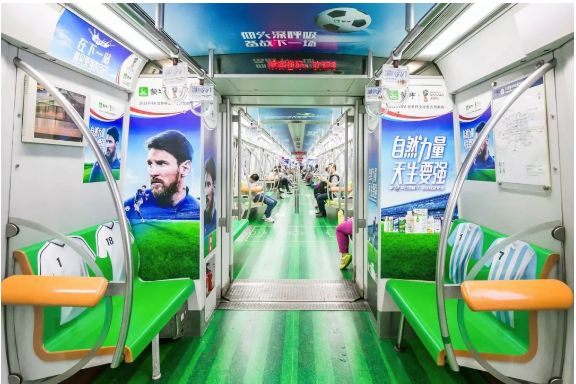
Mengniu’s advertsing featuring Messi on Beijing metro line 1, Graph from Baidu.com
Mengniu also received huge attention resulting from its TVC with Lionel Messi. On April 20th, Messi’s official Weibo(微博) posted a TVC for Mengniu World Cup, officially beginning the cooperation of Mengniu and Messi. The TVC focus on “natural power and born to be strong”(自然力量 天生要强), and tells the story of Messi’s standing up after the difficulties, setbacks and failures in a monologue. Rhythmic music and exciting football scenes are quite infectious. The TVC showed to the public and fans the reasons for Messi’s true greatness and aroused strong resonance.

Baidu Index trend line for the keyword “蒙牛” (Mengniu) between May 2018 and June 2018.
Obviously, the results of the competition are also impacting the performance of the various sponsorships. With Messi leading the Argentina squad into next stage, the search index of Mengniu has again experienced a significant increase. With the influence of Messi, the topic of “Born to be strong”(天生要强) quickly became a hot topic. So far, the topic has gained more than 0.11 billion reading and more than 0.0045 billion discussions on Weibo (2018, June 29).
Other examples including collaboration of Cristiano Ronaldo with WEY SUV brand, Neymar with OPPO mobile phone brands, implying the increasing relation of Chinese brands and sports event. To be able to appear in the world class arena itself indicates that some Chinese brands already have the strength of global competiveness. At the same time, the growing awareness of overseas marketing of Chinese enterprises has also prompted more enterprises to attach importance to sports marketing.
Various businesses benefit from the “world cup effect”
The world cup is not only a festival for football lovers but is also one of the most valuable events for businesses. It stimulates economy for its host country and other participants worldwide. Chinese’s enthusiasm did not fade away with the fact that China did not play in the world cup. Instead, Chinese businesses take over the event in foreign and in domestic field.

Baidu Index trend line for the keyword “俄罗斯旅游” (Russia tourism) between May 2018 and June 2018.
Baidu Index shows Chinese interest in Russia tourism roses to the highest peak on June 14th, the day World Cup starts its competition. It is also reported that Chinese tourists will also bring 3 billion RMB revenue to Russia during the world cup. The world cup has stimulated Russia’s tourism industry. Almost 100,000 Chinese tourists are leaving off to Russia to watch FIFA World Cup.

Baidu Index trend line for the keyword “世界杯门票” (World Cup Event Ticket) between May 2018 and June 2018.
Similarly, during 2018 world cup season, the searches on Baidu.com about event tickets soaring to a peak on June 15th, hours after the opening ceremony of World Cup 2018. News reported that the China’s event ticket sales reached to 40,251, 30 times more tourists than the last Brazil world cup’s (which is because the geographical proximity but also the rising interest for the sport in China).

Baidu Index trend line for the keyword “世界杯赌球” (World Cup gambling) between May 2018 and June 2018.
This year’s World Cup gambling has grown big in China. On June 15th, the digital index reached its highest peak, right after the beginning of the football competition. Then sensation goes beyond football’s original audience group as people who do not watch football also buy bets and the stakes go higher and higher. The amount of gambling revenue has reached 7.44 billion RMB for the first world cup week, then it nearly doubles to 11.897 billion RMB for the second week starting from June 18th to June 24th.

Baidu Index trend line for the keyword “世界杯球衣” (World Cup football jersey) between May 2018 and June 2018.
Similar situations also happened to the merchandising sectors, the world cup mascot and football jersey got its attention on June 14th, the peak of Baidu index shows Chinese’s interest on purchasing world cup souvenirs. The index of world cup football jersey and Mascot also reached its highest peak on June 14th, along with the grand opening of the world cup competition.
China, specifically Dongguan(东莞), has produced almost all of the merchandises sold in World Cup. A factory in Dongguan has sold around 168,769,986 flags from May 12rd to June 12rd. China actually plays a more important role in the world cup’s businesses than simply play the football.
For years, China has been developing its soccer power, including building soccer stadiums across each region and investing numerous amount of money into training soccer players. However, it is not enough, now China has put more resources into building its soft power, gaining the reputation and prestige worldwide. Football can be an essential key for China to gain access to display its power. China also attempts to win a bid to host the World Cup in the future, thus sponsoring FIFA and gaining global awareness in a good way is going to help China influence FIFA’s next decision.
Daxue Consulting works on evaluating the impact and benefits of sport, cultural and artistic events in China
Daxue Consulting team can assist you to identify key opportunities and track impact of your event and endorsement activities in China. We have extensive experience to leverage these findings and metrics into strategic actions on the Chinese market.


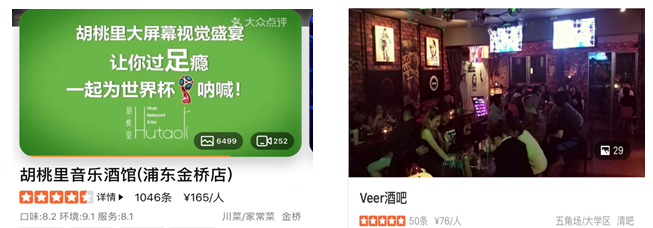


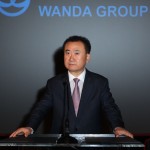
![[Infographic] China Football Industry: Trends and Opportunity](../wp-content/uploads/2016/12/Screen-Shot-2016-12-13-at-10.15.39-AM-150x150.png)








